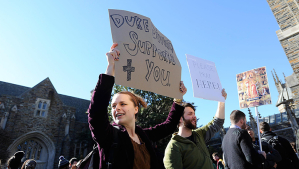
When Duke University first announced that it would be sounding the Muslim call to pray on Friday afternoons at the North Carolina university, many Christians were quite upset at what looked like favoritism for the Islamic students. But the college officials quickly decided that the call to prayer wasn't such a good idea, so they cancelled the plans almost immediately.
Originally, the call to prayer (also known as adhan) was set to be amplified from the college campus' bell tower at 1 p.m. every Friday to announce the start of the Duke Muslim Students Association's jummah prayer service. The chant was meant to last around three minutes.
"The adhan is the call to prayer that brings Muslims back to their purpose in life, which is to worship God and serves as a reminder to serve our brothers and sisters in humanity," said Imam Adeel Zeb, Muslim chaplain at Duke. "The collective Muslim community is truly grateful and excited about Duke's intentionality toward religious and cultural diversity."
"This opportunity represents a larger commitment to religious pluralism that is at the heart of Duke's mission," added Christy Lohr Sapp, the chapel's associate dean for religious life. "It connects the university to national trends in religious accommodation."
But many believed the call to prayer to be innappropriate for a university founded by Christians and Quakers in 1838. Rev. Franklin Graham, son of famed pastor Billy Graham, became very vocal about the university's plans, and released several statements when the announcement was made.
"As Christianity is being excluded from the public square and followers of Islam are raping, butchering, and beheading Christians, Jews, and anyone who doesn't submit to their Sharia Islamic law, Duke is promoting this in the name of religious pluralism," he said. "I call on the donors and alumni to withhold their support from Duke until this policy is reversed."
And that's exactly what happened. Fearing the consequences of Rev. Graham's message, Duke officials decided to reconsider the call to prayer, possibly allowing it to continue somewhere other than through the chapel bell tower.
"Duke remains committed to fostering an inclusive, tolerant and welcoming campus for all of its students," said Michael Schoenfeld, vice president for public affairs and government relations. "However, it was clear that what was conceived as an effort to unify was not having the intended effect."
A press release from the university points out that jummah prayer has been taking place in the basement of the Duke Chapel for many years, and the call to prayer chant has marked the beginning of those prayers since the beginning. It's the amplification of the prayers across the campus that has many questioning the college's intentions, though.
"The Muslim call to prayer that has been approved to go out across the campus of Duke University every Friday afternoon for three minutes includes 'Allahu Akbar'-the words that the terrorists shouted at the onset of last week's massacre in Paris," Graham said in a follow-up message on his Facebook page. "It includes the proclamation that there is no god but Allah and that Muhammad is the messenger of Allah. Will evangelical Christians be allowed the same three minutes weekly to broadcast the message across campus that God Almighty of the Bible sent His Son Jesus Christ to offer forgiveness of sins and salvation to all who will repent, believe, and call on His Name? Jesus said, 'I am the way, the truth, and the life. No one comes to the Father except through Me' (John 14:6)."
But Omid Safi, the director of Duke's Islamic Studies Center disagreed with Graham's words, as expressed during an interview with Huffington Post Live. "Every day from that same Duke chapel, church bells ring, and twice on Sunday," he said. "The cross is on the emblem of Duke University. The entire quad, and the entire campus of Duke University is laid out as a cross. And the Christian chapel is the very symbol of Duke University. So the kind of fanatical proclamation that Christianity is being erased from Duke's campus is frankly a poor indication of the intelligence of that argument."
But this isn't the last we've heard on the sensitive topic. As students assembled in protest of the university's backtracking on the call to prayer, Duke's chapel dean, Rev. Dr. Luke A. Powery, has called for some dialogue between religions to help ease the tension that has erupted on both sides. "Thoughtful, faithful people have agreed and disagreed with the various decisions made this week," he wrote in a message to parishioners on Sunday. "In the coming weeks, the Chapel will seek opportunities for constructive dialogue about these complex and important subjects as we all strive for deeper understanding and greater faithfulness to God."






